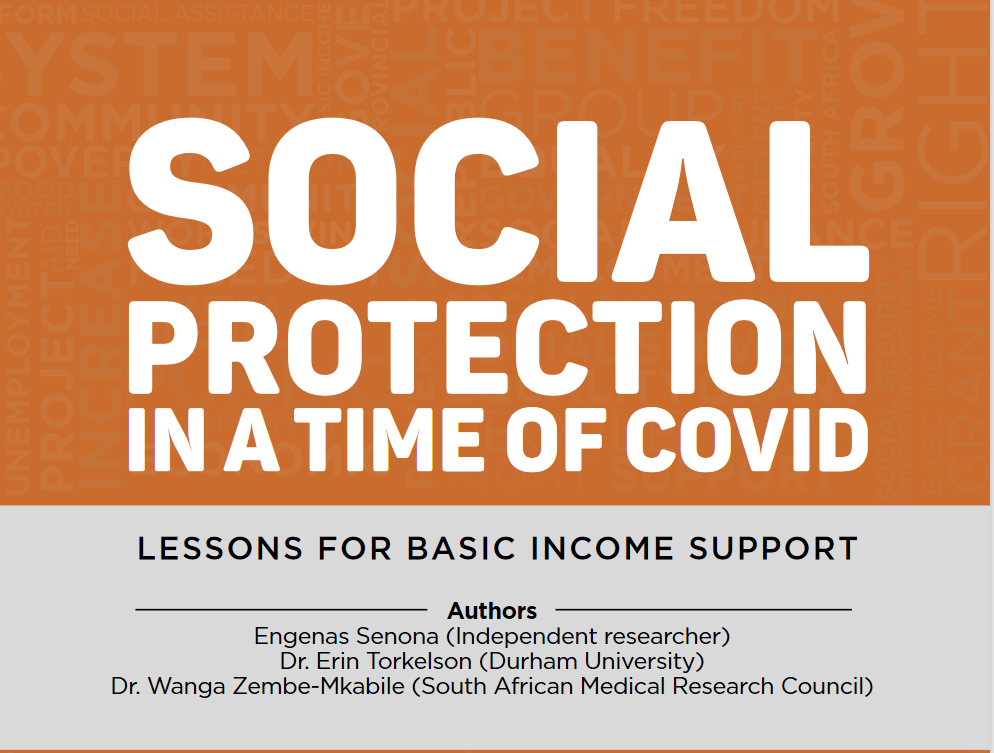Dr Wanga Zembe-Mkabile, a Specialist Scientist from the SAMRC’s Health Systems Research Unit (HSRU) was a co-Principal Investigator (co-PI) of a study that highlighted some of the discrepancies and challenges in the implementation and impact of the R350 COVID-19 Social Relief of Distress (SRD) Grant.
Titled: Social Protection in a Time of Covid - Lessons for Basic Income Support, the study report was launched virtually on 27 July through a webinar.
Through this study, Dr Zembe-Mkabile in collaboration with her peers, Dr Erin Torkelson from the Durham University and Mr Engenas Senona, sought to assess the processes involved in applying for, as well as the distribution of the Covid-19 SRD Grant – the two were commissioned by Black Sash, one of the well-known human rights organisations advocating for social justice in South Africa. The study was funded by Heinrich Boell Stiftung, Brot für die Welt and Claude Leon Foundation.
In order to gain the much-needed insight and perspectives towards building a case for basic income support (BIS) and developing a comprehensive social security system, the investigators conducted telephonic interviews with 26 people between August and December 2020. The participants, who included both successful and unsuccessful grant applicants, were each interviewed three times.
A sentiment echoed strongly by the report is that the grant was too little and that it excluded the deserving many. According to Dr Zembe-Mkabile, although many of the applicants said for the first time they felt “seen and cared for by the state”, for many low-income recipients, the grant was so small that it could only be used to pay for basic services, like water or electricity, that should be free.
“Overall, the grants were found to be largely underfunded and insufficient to alleviate the multiple hardships that individuals and households encountered daily, which were exacerbated by the pandemic,” said Dr Zembe-Mkabile, adding that these include hunger, unemployment, poverty, depression, gender-based violence, and inadequate access to water and electricity.
The Report also highlights that almost one-third of applications were rejected – something that Dr Zembe-Mkabile says is attributable to several challenges, including the conflicting information with national government databases. “Also, the online application system was inaccessible and exclusionary for those with no smart phones, internet access, and digital literacy,” she emphasizes.
Another key finding of the Study was that people residing in rural and peri-urban areas encountered far greater challenges in accessing the grant than those living in urban areas, with many incurring further debts due to transport costs.
However, in the end, the study calls for a constitutional right to be upheld and that is social security with dignity and have proposed several key recommendations. Notably, the team recommended that the SRD Grant be permanently turned into Basic Income Support (BIS) for people from 18-59 years and to receive R585 as a starting point but that this would need to be increased above the food poverty line to the upper bound poverty line (currently at R1268) as soon as possible.
The Report also recommends that the application and distribution systems should be free, easy to access and have effective, automated and face-to-face options, including for recourse or appeals.
On Sunday July 25, 2021, just two days before the launch this report, President Cyril Ramaphosa announced that the SRD Grant will be reinstated until March 2022 and that the eligibility criteria have also been expanded to include unemployed caregivers who receive the Child Support Grant (CSG) on behalf of children.
During the webinar, the Study Team and Black Sash welcomed this announcement saying that it is a step closer to what the Report was proposing, saying that Covid-19 and associated lockdowns worsened the poverty status and quality of life of many people in South Africa who were already living precariously pre-pandemic.
“Although it welcomes the reinstatement of the Covid-19 grant, it is concerning that the amount was not increased to meet the food poverty line which is currently R585 per month”, said Nelisiwe Xaba, paralegal fieldworker and member of the Black Sash.
Dr Catherine Mathews, Director of SAMRC’s Health Systems Research Unit (HSRU) congratulated Dr Zembe-Mkabile and the team on what she described as a “critically important work”. Dr Mathews said: “Considering the extreme poverty and inequality in South Africa, this research lays out the way forward to a package of basic income support in the context of a wider social protection safety net. We can’t afford to ignore the recommendations of this report!”
- Full Report: Social Protection in a Time of Covid - Lessons for Basic Income Support
- Recording: Report Launch | View

